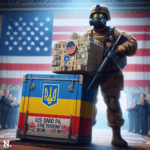That relation between Israel and Hezbollah has grown tense once again, a harbinger of catastrophic war. Retired US officials and regional specialists argue that Israeli behavior is complex in their latest analyses. This paper analyses how the dynamics of the risks perceived by Israel will impact regional stability.
Israel and Hezbollah
Hezbollah is a militant group from Lebanon that gets support from Iran and has been a long-time enemy of Israel. They’ve fought in several wars, like the one in 2006, which caused a lot of damage and casualties on both sides. Since then, Israel and Hezbollah have mostly stopped fighting, but there are still sometimes small clashes and surprise attacks.
Recently, tensions between Israel and Hezbollah have gotten worse. Hezbollah has more weapons now, like rockets and missiles, which they keep in large numbers. This worries Israel because it’s a big threat to their safety. In response, Israel sometimes bombs Hezbollah’s bases in Syria or Lebanon to weaken them and make it harder for them to attack.
Israel’s Military Strategy
Some people say that when Israel attacks Hezbollah, it’s not just to keep safe but also to gain political advantages. They think Israel’s leaders might use the threat from Hezbollah to get more support at home or to change how things work in nearby countries. They’ve noticed that when Israel does military stuff, like airstrikes, it often happens when big political things are going on in Israel or with other countries nearby. This makes them think Israel’s actions aren’t just reactions but part of a bigger plan to stay strong and have more say in the region.
The fighting between Israel and Hezbollah is also connected to what’s happening in countries like Iran and Syria. Hezbollah gets a lot of help from Iran and sees itself as a big weapon against Israel and a way to have more power in Lebanon and beyond. Israel’s military attacks on Hezbollah are seen as responses to Hezbollah causing trouble. They’re also seen as ways to stop Iran from having too much influence in the area.
Israel worries a lot about Hezbollah having missiles and maybe attacking them. So, Israel does things like airstrikes to weaken Hezbollah and make sure they can’t hurt Israel. This is all about keeping the country safe and making sure there’s no big war. Israel is always preparing to defend itself and make sure Hezbollah doesn’t start a big fight.
Humanitarian Concerns and International Response
Setting aside any geopolitical intrigue and military calculations, any potential conflict would not empty itself of humanitarian impact. The potential consequences of another escalation between Israel and Hezbollah include civilian casualties. As well as displacement, and damage to infrastructure, which heighten tensions in the region. Humanitarian agencies, including the United Nations, advocate for restraint to prevent a full-scale war. They emphasize the importance of dialogue to resolve conflicts and mitigate humanitarian impacts. Efforts to prevent escalation focus on averting widespread suffering and preserving stability. Dialogue remains crucial to prevent the situation from worsening and to promote peace in the region.
The prospect of renewed conflict between Israel and Hezbollah elicits varied responses within the international community. Key players invested in containing this process of escalation at its first stage are calling for de-escalation. Regional players, such as Saudi Arabia and the Gulf states, closely monitor events in the region. They are concerned about the broader implications for regional stability and security.
The complicated relationships between Israel and Hezbollah are a delicate power balance for the Middle East. Though backed by security reasons, the claims of military actions that Israel took up against Hezbollah have undeniable political motives. The chronic tensions mayblaze into a devastating war; if such happen, it would conceive results quite unforeseeable in the region. At this point, de-escalation efforts are crucial. Keeping politico-diplomatic dialogue open is essential to prevent a humanitarian disaster. It’s necessary to salvage regional stability in the Middle East.
Insights
In short, Israel deals with Hezbollah by thinking about keeping safe, making smart political choices, and understanding how different countries around them behave. The fighting between them shows how complicated things can get. It’s really important for other countries to help find peaceful solutions. This paper talks about what Israel thinks about Hezbollah, especially about staying safe and making good decisions. It says we need to talk things out and find ways to solve problems to keep everything calm in that part of the world.





